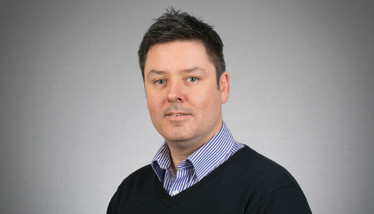Achieving Excellence
Sitting Down With… Tom Moody, VP of Technology Development and Commercialization at Almac, Craigavon, UK.

This article is part of our special focus on "traditional" pharma: The Small Molecule Manufacturer (read more here). You can find more articles from The Small Manufacturer here.

Tom Moody, VP of Technology Development and Commercialization at Almac, Craigavon, UK
Has science always been a passion?
Science was always one of my favorite subjects at school. Initially, I loved the idea of just mixing things together, but as I grew I also came to appreciate the practical side of it. I was fascinated by how science could be applied to solve problems – especially when it came to chemistry. My passion pushed me to pursue a degree in chemistry and that is where I began to excel; I was proud to graduate from Queen’s University Belfast, with the top grades in my year group and subsequent completion of a PhD.
What other interests have you pursued?
I’ve always been interested in the ways that businesses operate and, as I started work in the pharma industry, I wanted to understand how pharmaceutical companies, as commercial entities, were able to invest, reinvest and grow. I joined Almac in 2001 and quickly became a team leader. But I wanted to differentiate myself from others working in the organic chemistry department and bring value to the business. I realized I could only do that by offering up ideas and solutions that could have a meaningful impact on the company’s future. Was there a technology that I could help introduce that could have benefits for the company? Or were there other avenues, yet to be considered, that were worth exploring?
In 2003, I decided to pursue a masters in business alongside my work at Almac to help improve my knowledge of the commercial world. During that period of time, I began to develop a business plan outlining the benefits of biocatalysis for Almac. I presented it to the senior management team, which must have gone well, because they allowed me to begin developing the technology.
How did your role change?
My role expanded and I found myself in new territory. The success of our biocatalysis technology depended on a diverse international team. I began to work with microbiologists, enzymologists and in silico chemists and physicists who all spoke their own scientific languages. In the early days, I had to learn to communicate with people from these different scientific disciplines, which wasn’t an easy feat! But it was necessary (and fun) because I was responsible for bringing the voices of these groups together so the project could achieve what it set out to do. We had a common goal and, in spite of our differences, our passion for innovation helped us work cohesively and deliver the new chemistry.
What do you do in your current role?
Essentially, I have to draw upon the experience that I’ve developed throughout my career. From assessing new technologies coming through the pipeline and making decisions about their commercial viability, to seeing R&D projects through from concept to completion; I get real satisfaction from knowing that an idea that existed on paper can be transformed into a commercial product that is of benefit to our customers in different countries.
What advice can you give to bench scientists who want a career in commercial operations?
Really ask yourself whether you’d prefer to be working on the technical side of the business or the commercial side. If science is your primary interest and you’re not quite sure whether you are suited to the managerial aspects, then there’s nothing wrong with climbing the “technical” ladder. I think that you really have to have drive and ambition to pursue a career in management. If you want to do this, there are ways of improving your knowledge of business. For me, I got an MBA; but others find mentors who will be able to give the guidance and support needed. It is important to take on board the ideas of people from different disciplines and set a development plan with your line manager. Try to expand your professional skill set to the best of your ability.
How do you engage with the wider scientific community?
I have an honorary professorship at Queen’s University Belfast. The position allows me to write peer-reviewed papers and, by the end of 2020, I hope to have published more than 100 papers – something of which I’m very proud of, as I’m not an academic 100 percent of the time!
One of my personal goals for 2020 is to help build science awareness for school students and graduates. There’s definitely a need for young scientists to enter industry but, currently, many young people with an interest in science are pushed into medicine and other healthcare-related careers. I want them to be aware that there are fulfilling career options available to them in pharma too; I have certainly enjoyed the years I’ve spent in industry.
After finishing my degree, I envisioned a career in science communications. However, life took an unexpected turn and I ended up teaching abroad. Though the experience was amazing and I learned a great deal from it, I jumped at the opportunity to work for Texere. I'm excited to see where this new journey takes me!



















